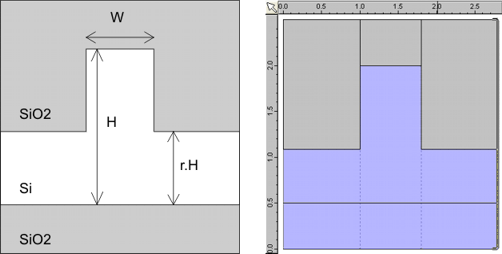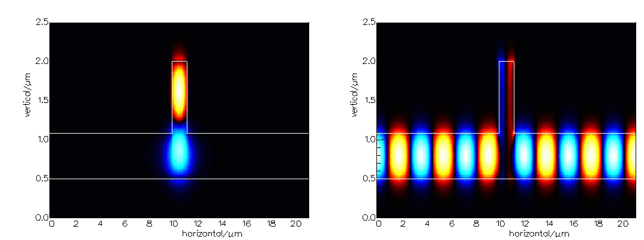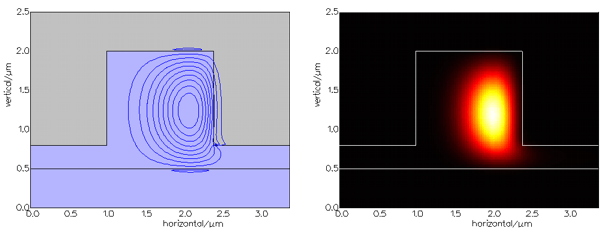FIMMWAVEA powerful waveguide mode solver |
    |
Modes of a Silicon Waveguide (SOI Waveguide)Silicon photonics simulation with FIMMWAVE softwareModelling the high refractive index contrasts associated with silicon photonics and silicon waveguides (or silicon-on-insulator SOI waveguides) is a challenge that requires fully vectorial simulation tools. FIMMAVE allows you to model silicon waveguides accurately and efficiently thanks to its fully vectorial mode solvers, and to calculate mode losses for bend modes and leaky modes in silicon photonics. We will show here how FIMMWAVE can be used to simulate a wide range of silicon rib waveguides. Please note that similar calculations can be performed on buried silicon waveguides, ridge silicon waveguides and other geometries. Calculation of the mode profiles
Calculation of the mode profilesThe FMM Solver was used to find the modes of a polarisation-independent structure. The mode profiles for the fundamental TE-like and TM-like modes are plotted below.
The FMM Solver being fully vectorial, it allows you to observe effects such as optical leakage of the minority field. You will find an example below, in which the first order TM-like mode is guided for the main (Ey) field component but leaky for the minority (Ex) field component.
A wide range of parameters can be calculated for each mode, including the effective index, group index, mode dispersion and mode loss in the case of leaky modes or bend modes. All these parameters can be scanned with varying geometry of the waveguide, allowing to fine-tune the design of the SOI for specific purposes. Examples of SOI optimisation with FIMMWAVE include polarization-independence, low bending loss and single-mode propagation. The thermo-optic module also allows you to design SOI thermo-optic switches in 3D. Successful attempts to obtain simultaneously polarization independence and single-mode propagation using FIMMWAVE are for instance reported in [1]. Study of single mode conditionsThe FMM Solver allows you to characterise optical leakage by calculating the side loss, an estimate of how much light would radiate away horizontally if the mode was propagating. Although FIMMWAVE also provides you with rigorous tools to calculate horizontal leakage such as PMLs, the side loss is a very fast tool which allows you for instance to identify the waveguide geometries leading to single-mode propagation. Side loss is scanned below with varying width of the rib, for the first order TE-like mode. This given waveguide will be single mode at the wavelength of 1.55um for a width of 1.27um or less.
Bend modes of a silicon waveguideYou can see how the bend modes of this waveguide were calculated with the FMM Solver here.
Reference[1] L. Vivien, S. Laval, B. Dumont, S. Lardenois, A. Koster, E. Cassan, “Polarization-independent single-mode rib waveguides on silicon-on-insulator for telecommunication wavelengths”, Optics Communications 210, pp. 43-49, Sept 2002 More publicationsClick here to find publications that include FIMMWAVE simulations of silicon waveguides on Google Scholar.
|








